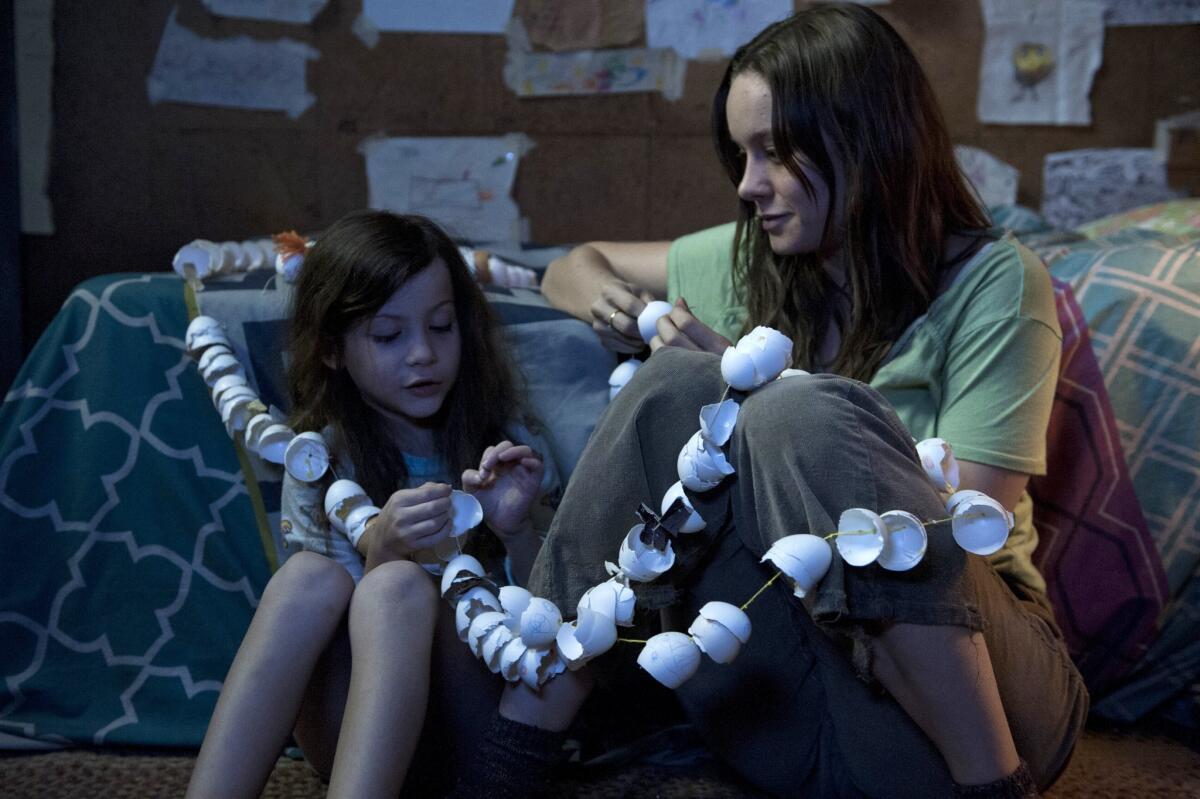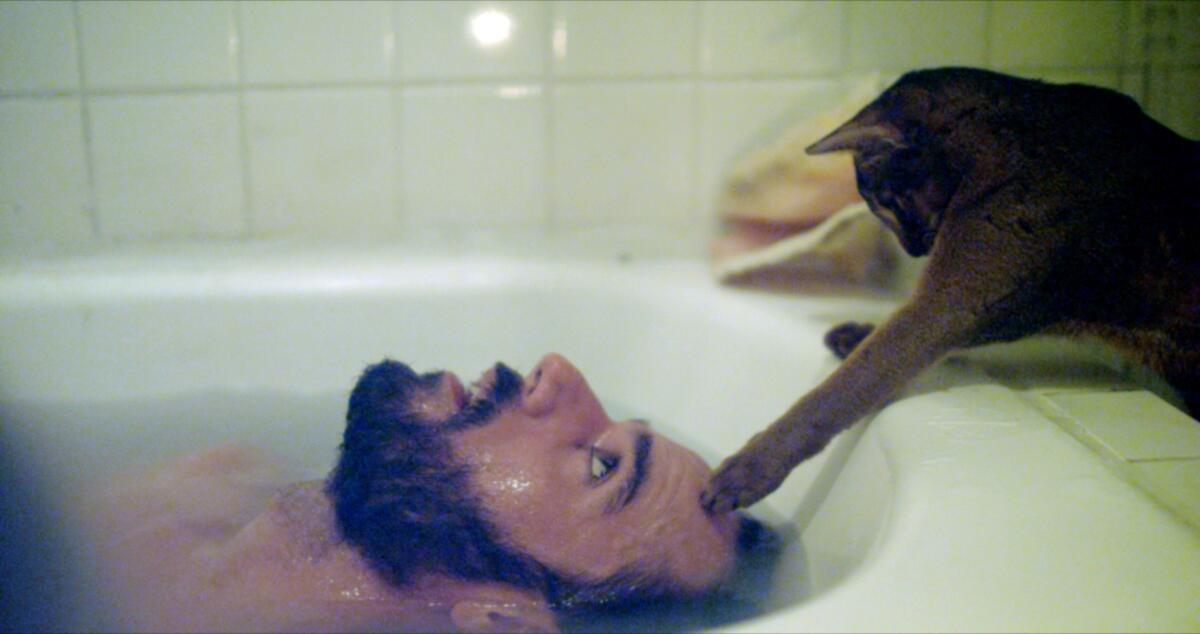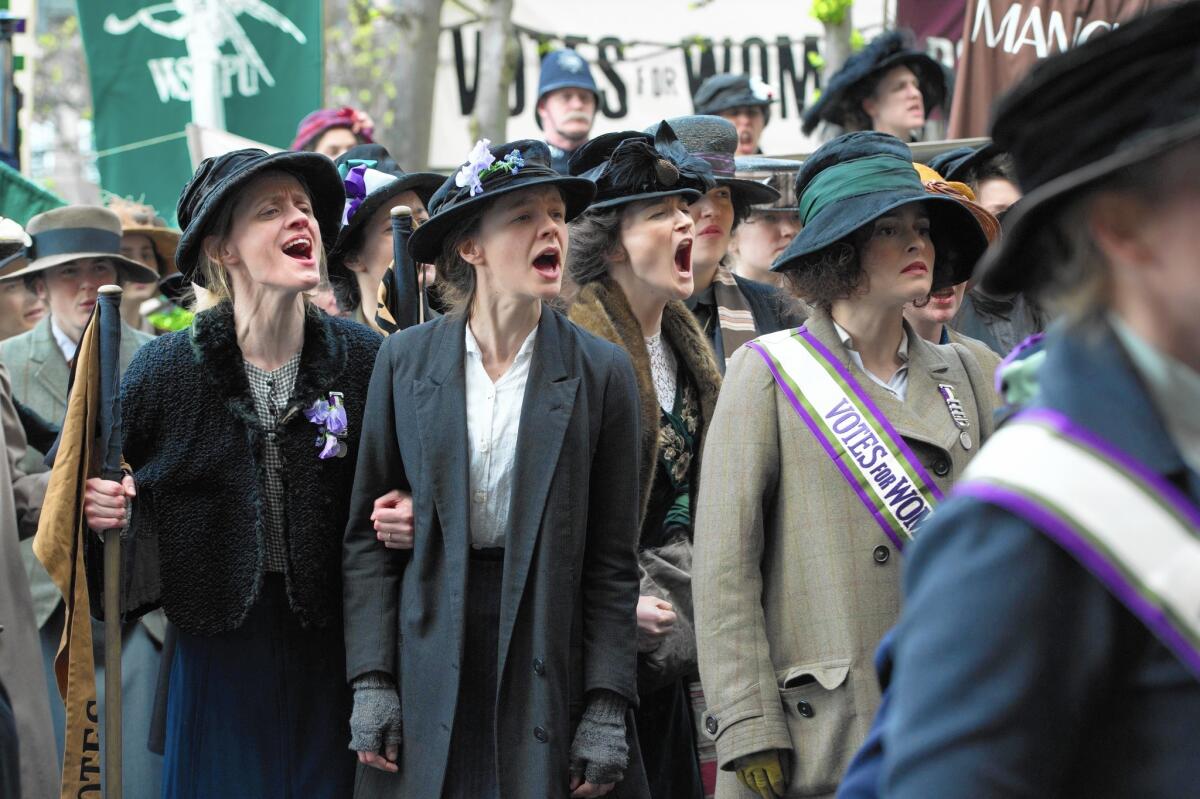Newsletter: Indie Focus: Breaking free with ‘Room,’ ‘Suffragette’ and ‘Nasty Baby’
- Share via
Hello! I’m Mark Olsen, and welcome to your weekly field guide to a world of Only Good Movies.
The Envelope Screening Series and Envelope Independent Screening Series are now in motion. This week alone you can attend screening/Q&A events for “Brooklyn,” “Trumbo” and “Room.” You can find out more at events.latimes.com.
We also have two Indie Focus Screening Series events booked for November, with the French submission for the foreign-language film Oscar, “Mustang,” and Sundance award winner “James White.” Keep an eye out here for RSVP info: events.latimes.com/indiefocus/.
And you also can listen to our recent podcast series here.
'Room'
One of the season’s big surprises has been “Room.” The story of a young woman held captive for seven years and the young son she tries to nurture and protect, the film walks an emotional tightrope, exploring the warmth of their relationship and the devastating circumstances they must overcome.
In his review, Kenneth Turan said, “The film's accomplishment is its rare ability to give full weight to both sides of the emotional equation as it tells the story of a young woman imprisoned for years in a single room in a tiny shed and the young son who was born to her there and knows no other world.
“Directed by Ireland's Lenny Abrahamson with uncanny sensitivity and an intuitive sense of what this situation would be like and transcendently acted by Brie Larson and Jacob Tremblay, ‘Room’ is several things by turn: creepy, frightening, exhilarating and then frightening and exhilarating all over again.”
Brie Larson and Jacob Tremblay appear in a scene from the film “Room.” 
Brie Larson and Jacob Tremblay in "Room." (George Kraychyk / Associated Press)
The film has been a breakout vehicle for 26-year-old actress Larson. Rebecca Keegan first caught up with Larson at the Telluride Film Festival, during the first flush of interest around the film. There the actress said, "When I was younger, watching movies, it felt like everything was glossy and beautiful, and I didn't really relate to it. It's been really important to me to show something that's real. So if we're gonna do this movie, I'm not gonna wear makeup. It's not gonna look pretty, it's gonna look real."
Rebecca spoke with Larson again as the film was opening and getting more attention. "I think if a movie makes you cry, you probably needed to cry," Larson said.
Larson’s breakthrough with “Room” has its roots in the acclaim she previously received for the movie “Short Term 12.” I interviewed her ahead of that film’s world premiere at the 2013 SXSW film festival and again alongside director Destin Daniel Cretton for the film’s release. I also had the pleasure then of moderating a Q&A with Larson for a roomful of aspiring actors, and what has always stayed with me was her remarkable candor in talking about the struggles of a young performer to those she considered her peers.
'Suffragette'
The new film “Suffragette,” directed by Sarah Gavron, written by Abi Morgan and produced by Alison Owen, tells the story of the struggle by women to get the right to vote in England in the early 20th century through the eyes of a fictionalized laundress. The film, starring Carey Mulligan, Meryl Streep and Helena Bonham Carter, has become a flashpoint of controversy for how it tells its story and who it chooses to include, becoming an instructive case study in the difficulties of making a movie that engages with real-world events.
As Kenneth Turan notes in his review, “Still, despite all these good things, ‘Suffragette’ does not live and breathe like the best films do, and that is a shame. As a closing crawl reminds us, there are still parts of the world where women cannot vote, and as good as 'Suffragette' is when at its best, the story it tells deserves better."
From left, Anne-Marie Duff, Carey Mulligan and Helena Bonham Carter in "Suffragette." (Steffan Hill / Focus Features)
In the New York Times, critic A.O. Scott added, “‘Suffragette’ is an admirably modest movie. It does not quite have the grandeur and force of ‘Selma,’ and the script has a few too many glowingly emotive speeches. The final turns of the tale are suspenseful, but also a bit frantic. But it is also stirring and clear-eyed — the best kind of history lesson.”
At BuzzFeed, critic Alison Willmore grapples with everything that has surrounded the movie in relation to the story onscreen.
“The movie isn’t just about one woman’s awakening to the cause, it’s about how she essentially immolates her life and her identity to become a member of its infantry, which isn’t a less worthy story, but it is a much more difficult one to tell. 'Suffragette' wants to celebrate women like Maud but ends up making her into an abstract — so much suffering, and all she got was a lousy T-shirt.”
At Telluride, Keegan spoke to Meryl Streep about how the film also speaks to contemporary struggles for women’s rights.
"It would be an important thing for the film to raise the question of why, why this was so difficult and long a process," Streep said. "What is the nature of this resistance? What is it in the human psyche that wants to reinforce a dominance?"
Amy Kaufman sat down recently with Mulligan, who spoke about how making the movie helped her find her own inner strength.
"When I started working, I was often the only girl in a roomful of men," Mulligan said. "I'd either try to please people by being lovely and sweet all the time — being polite and nice and getting the job done — or going in quite laddish and acting tough.
"Making 'Suffragette' made me realize I don't have to do either of those things. I can be a woman and be confident in my ideas, and I don't have to play anyone. I'm an adult, and I can get my voice heard without having to manipulate the situation."
'Nasty Baby'
I’ve been a fan of filmmaker Sebastián Silva for some time now, and so I was excited to write about his new film, “Nasty Baby,” even before it premiered at this year’s Sundance Film Festival. It's the story of a single woman (Kristen Wiig) in Brooklyn trying to have a baby with the help of her two best friends, the gay couple Freddy and Mo (played by Silva and Tunde Adebimpe). The movie is part comedy of manners, part disturbing social satire.
In his review, Robert Abele compared the film to one of Silva’s earlier movies when he said, “In much the way 'Crystal Fairy' blossomed when we were snapped out of our chuckling repulsion, 'Nasty Baby' rights itself intriguingly when Silva pushes his characters into unknown territory and lifestyle is imposed upon by life.”
Sebastian Silva in the movie “Nasty Baby.”
Sebastián Silva in "Nasty Baby." (The Orchard)
In Time magazine, writer Daniel D’Addario celebrated “Nasty Baby” as “the gay film audiences need precisely because it isn’t trying to be about all of America. It gets a particular aspect of human experience, the way films about straight people have been doing since film was invented.”
In a recent Q&A with Kristen Wiig, she talked with me about the breadth of work she has recently done, which includes “Nasty Baby,” “Welcome to Me,” “The Diary of a Teenage Girl,” “The Martian” and “Ghostbusters.”
“Well, they all start with the same base, which is a desire to do the project, which usually comes from the script and/or the director,” she said. “It sounds so simple, sort of trivial, but I just get a feeling and if I want to do it, I try to do it.”
'Mulholland Dr.'
“I like that almost better than ice cream.” So says David Lynch during behind-the-scenes footage while shooting his movie “Mulholland Dr.,” which some consider his masterpiece. Newly released on a Criterion Collection edition Blu-ray and DVD, the film remains every bit as remarkable today as when it was released in 2001. It would eventually be crowned the best movie of the decade in a number of critics’ polls.
The movie is a twisting, complicated tale of love and identity set amid the dream factory of Hollywood, both as a place and an industry. The movie provided the breakout role for actress Naomi Watts, who, like her character in the movie, had to that point been struggling to make it for years.
Among the bonus features on the new set are that behind-the-scenes footage of the film being shot as well as a series of recent interviews with Lynch and Watts, as well as actors Justin Theroux and Laura Harring, composer Angelo Badalamenti, cinematographer Peter Deming, production designer Jack Fisk and casting director Johanna Ray.
In an interview, Watts notes Lynch’s feelings for anyone who might find the film’s elliptical, enigmatic storytelling confusing: “His theory is we don’t all have to have the same understanding.”
Email me if you have questions, comments or suggestions, and follow me on Twitter @IndieFocus.
Only good movies
Get the Indie Focus newsletter, Mark Olsen's weekly guide to the world of cinema.
You may occasionally receive promotional content from the Los Angeles Times.









